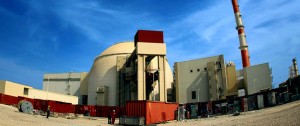 (Reuters) - Arab Gulf states sought reassurances from Iran at a U.N. nuclear agency meeting this week over the safety of its only atomic energy plant, which is located in an earthquake-prone coastal area, diplomats said on Thursday.
(Reuters) - Arab Gulf states sought reassurances from Iran at a U.N. nuclear agency meeting this week over the safety of its only atomic energy plant, which is located in an earthquake-prone coastal area, diplomats said on Thursday.
The Bushehr facility on Iran's Gulf coast is a growing worry for nearby countries: if radiation ever does escape it could be blown over the Gulf to Qatar's capital Doha and the main oil exporting ports of the United Arab Emirates.
Tehran has repeatedly rejected safety worries about the Russian-built reactor, which began operations in 2011 after decades of delays.
The United Arab Emirates and Saudi Arabia raised the issue during a closed-door June 3-7 meeting of the 35-nation Board of Governors of the U.N.'s International Atomic Energy Agency (IAEA), the diplomats said.
"(They) share the same concern because of the geographical proximity (to Bushehr)," said a senior Vienna-based diplomat.
The plant is closer to five Arab Gulf capitals than it is to Tehran, the Iranian capital.
Arab Gulf states want Iran to join the 75-nation Convention on Nuclear Safety, negotiated after the 1986 nuclear disaster in Chernobyl which sent radioactive dust across much of Europe.
Iran is now the only country operating a nuclear power plant that does not belong to the nuclear safety convention, designed to boost safety through peer review and mutual oversight.
Iranian officials and the Russian company that built Bushehr said it was unscathed by a powerful earthquake that shook the region nearly two months ago.
But that has not stemmed concerns about safety, especially as Iran's Atomic Energy Organisation said just hours after the April 9 earthquake that more reactors would be built there.
RESPONSIBILITY
Iran's ambassador to the IAEA said the Russian contractor was handling safety-related issues.
"We have expected them to apply the highest safety standards in this reactor and therefore it is their responsibility," Ali Asghar Soltanieh told reporters late on Wednesday.
U.N. inspectors occasionally visit Bushehr - which was started by Germany's Siemens before the 1979 Islamic Revolution and was taken over by Russian engineers in the 1990s - to check nuclear material but not to conduct safety inspections.
Earlier this year IAEA reports said Iran had informed inspectors visiting the plant in mid-February and again last month that the plant was shut down but gave no details.
"Maintaining safety is the responsibility of Iran and we don't know the reason why Bushehr is shut down," IAEA Director General Yukiya Amano told a news conference on Monday.
The West suspects Iran is seeking the capability to develop nuclear weapons behind the facade of an atomic energy programme.
But, unlike Iran's uranium enrichment sites, Western governments do not see Bushehr as a military risk since it is of a type less suited to generating plutonium for bombs and also because Russia insists on taking back the spent fuel.
Iran says its nuclear programme is a peaceful bid to generate electricity and to produce medical isotopes.
By Reuters
The Iran Project is not responsible for the content of quoted articles.

 QR code
QR code